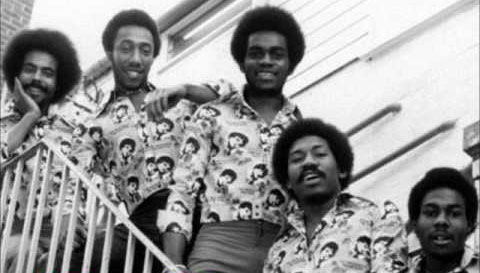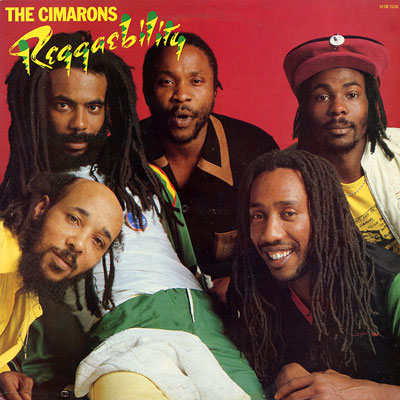THE CIMARONS

Remembering the British reggae pioneers
by Eric Doumerc
(June 2022)
The Cimarons were one of the first homegrown reggae bands to emerge in Britain in the 1970's and first made their name by backing the Jamaican artists who toured the British Isles back then. The band was formed in 1969 at the Tavistock Youth and Community Centre in Harlesden (North London) and first included Carl Levy (keyboards), Franklin Dunn (bass), Maurice Ellis (drums), Locksley Gichie (guitar), and Winston Reid (vocals). Sonny Binns, who played with the Rudies, joined the band when Carl Levy left in the late 1970's.
The band was very much influenced by soul music as several of its members were James Brown and Marvin Gaye fans, and they initially covered a lot of soul hits. They first appeared at various local youth clubs, but their professionalism led to an invitation to tour West Africa, where they were given the opportunity to hone their craft.
After their West African tour, they began to work as session musicians for various producers like Lambert Briscoe (as The Hot Rod All Stars) and an appearance at the Cue Club in London got them noticed by a Trojan executive. On that night they performed a perfect version of King Stitt's "Fire Corner," a big hit at the time, and convinced the people at Trojan Records that an English-based band could play reggae well. This led to a lot of session work with Trojan as well as backing Jamaican artists touring England.
They recorded under various monikers like The Love Children, The Hot Rod All-Stars, The Setters, and The Maroons. Working for the producer Lambert Briscoe as the Hot-Rod All-Stars, they recorded such tunes as "Skinhead Don't Fear," "Pussy Got Nine Life" and "Moonhop in London" which all targeted the "skinhead market," as the skinheads had enthusiastically supported Jamaican music in the late 1960's.
They recorded "Penguin Funk" for the producer Mark Dorane, and then a version of "Mammy Blues," produced by Dandy Livingstone. It failed to make much of an impact. In 1974, as The Maroons, they recorded a version of KC and the Sunshine Band's massive disco hit "Rock Your Baby," but the B side of that 45 featured a Franklyn Dunn composition entitled "Rosey Dozey" which showed that they could equally hold their own as a reggae band.
Their first album, In Time, was released on the Trojan label in 1977 and mainly included soul covers done reggae-style. Apparently, Trojan had insisted on the soul and pop covers, but the band were not happy with the final result which satisfied neither reggae fans nor pop fans. The sleeve features the band wearing Afros and bearing their chests. The album opened with a cover of The O'Jays' "Ship Ahoy," a tune about the transatlantic slave trade. Other covers include a version of Ruby Andrews' "Didn't I Fool You" and their version of Jimmy Cliff's "You Can Get It If You Really Want," which had been featured on the soundtrack to the film The Harder They Come. They even covered Whiting and Donaldson's "My Blue Heaven."
By 1975, the band had joined hands with the producer Junior Lincoln, who released a reggae version of The Fatback Band's "Wicky Wacky" on his Vulcan label. The B side was a very good version of Burning Spear's "Tradition." As with the "Rock You Baby" 45, they put the soul cover on the A side, and the reggae one on the B side, thus trying to make an impact with the more popular soul or funk music at the time.
Their second LP, On The Rock (1976), was recorded both in Jamaica and in England and included a cover of Bob Marley's "Talking Blues" which charted in Jamaica where it was released on Tommy Cowan's Talent Corp label. The album also featured a tribute to Paul Bogle, the leader of the 1865 Morant Bay Rebellion who was made a National Hero by the Jamaican government in 1969.
"Hear Talk of Inflation" showed that the band was capable of producing some conscious "roots" material to address the social issues of the day, with thoughtful lyrics. The beautiful track "Rock Rock Reggae Rhapsody" blended reggae and rock in a seamless way and showed that the band had been listening to Bob Marley and the Wailers very keenly. The use of keyboards and electric guitar on this track is reminiscent of the best rock-oriented reggae produced at the time by Marley and his band. The album also included an early version of "Dim The Lights," a love song that would later propel Winston Reid to a solo career.
Their next album, Maka (1978), contained roots tracks like "Mother Earth," "Civilization," and "Willin' (Rock Against Racism)" and consolidated the band's eclectic approach, mixing traditional roots reggae with a more modern sound dominated by keyboards. Around the time the album was released, the band played a number of Rock Against Racism gigs.
Next came a live album recorded at the Roundhouse in the summer of 1977 which was released in 1978 on the Polydor label as Live at the Roundhouse. That was the album which revealed to a wider audience the band's talent as it showcased their accomplished musicianship, with blistering guitar solos and a very good version of The In-Crowd's "Born in Ethiopia," with an extended dub at the end. That tune alone is worth the price of the album and is evidence of the band's efficient rock-based approach. The LP opened with their cover of the O'Jays' "Ship Ahoy" and closed with their rousing "Rock Rock Reggae Rhapsody," a true masterpiece. This live album probably constituted the apex of the band's career.
1980 saw the release of the album Freedom Street on the Virgin label, with the title track being a cover of Ken Boothe's song, brightened up by some great horns. Other strong tracks included "Reality," "Release Me" and the fast-paced "Distraction" . This album was graced by the presence of the legendary hornsman Eddie "Tan Tan" Thornton and the great drummer Jah Bunny (Lloyd Donaldson) who was a member of the reggae band Matumbi.

The album Reggaebylity (Hallmark, 1982) featured several songs by The Beatles and was intially a Paul Mc Cartney project. Sonny Binns was by then playing keyboards with the band and Matumbi's "Jah Bunny" (Lloyd McDonald) was brought in on drums. The sleeve photograph was by Linda McCartney. The album contained covers of McCartney's "Mull of Kyntire" and The Beatles' "Love Me Do" as well as the band's own versions of Marguerite Monnot's "Les Pauvres de Paris" ("Poor People of Paris") and Eva Boswell's "Pickin' A Chicken." There were also covers of Max Bygraves' "Meet Me on the Corner" as well as Wings' "C Moon." The band was probably aiming for a wider market and trying to get some mainstream acceptance, but the album does not seem to have met with any success. The band also recorded a version of Buddy Holly's "Peggy Sue" which was later released on a single on the Imp label in 1982.
Reggaebylity seems to have been the band's last album. They did release an album entitled On The Rock Part 2 in 1983, but it is composed of tracks recorded in 1976.
In the early 1980's, Winston Reid left the band and, as Winston Reedy, had a hit in the reggae charts in 1982 with "Daughter of Zion" and another one in 1983 with a recut of "Dim The Lights," a song he had composed for the On The Rock album.
The Cimarons are today considered as one of the most important British-based and homegrown reggae bands and their contribution to the growth of a new brand of reggae music based in Britain cannot be overestimated. In July 2014, a blue plaque was affixed at the entrance of the Tavistock Youth and Community Centre in Harlesden to honour the band's contribution to reggae and British culture.
References:
De Koningh, Michael and Marc Griffiths. Tighten Up! The History of Reggae in the UK. (London: Sanctuary Publishing, 2003).
Griffiths, Marc. Boss Sounds: Classic Skinhead Reggae. S T Publishing, 1995.